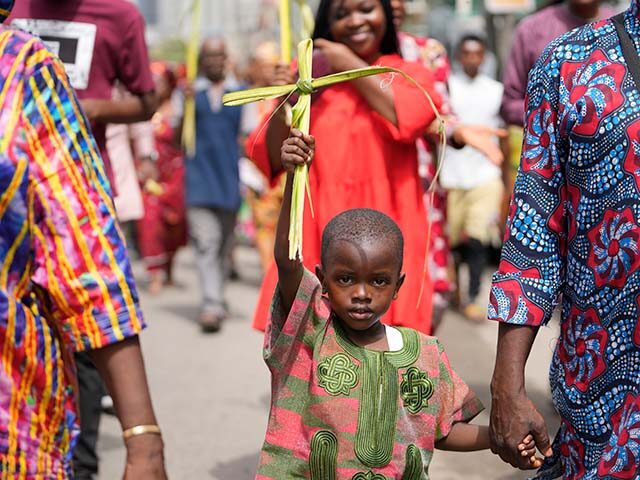Nigeria’s police chief on Thursday ordered around-the-clock enhanced security at public venues across the country throughout the Easter weekend, fearing religious violence in a country where Christians are under almost constant attack.
Inspector-General of Police (IGP) Kayode Egbetokun said through a spokesman that extra resources would be devoted to maintaining security at “worship centers, train stations, highways, motor parks, airports, waterways, recreation centers, banks, and other financial institutions, as well as other critical infrastructures and public spaces.”
“The IGP also assures all travelers who will be visiting their hometowns and other places within the country for the festivities of adequate security irrespective of the medium of such travels whether by road, air, waterways, or rail, as deployments have been increased and visibility patrols intensified in all areas including aerial patrol and surveillance,” Egbetokun’s office said.
“As we commemorate the crucifixion, death, and resurrection of Jesus Christ, let us come together in unity and vigilance to ensure a safe and peaceful environment for all,” the statement said.
The Nigeria Security and Civil Defense Corps (NSCDC) said on Thursday it would deploy 35,000 personnel to protect both Easter crowds and “critical national assets and infrastructure,” including operatives from its anti-vandalism, special intelligence, special female, and special forces squads.
The Christian Association of Nigeria (CAN) pushed back against an informal curfew proposed for the Ifeland region to minimize the risk of violence during the Easter holiday. CAN said it had received assurances from Muslim and tribal leaders that the weekend would be peaceful.
Speaking at the dedication of a new church last weekend, Plateau state governor Caleb Mutfwang made an appeal for peace in the “Middle Belt” or central Nigeria, where Muslim herders from the Fulani tribes have slaughtered hundreds of Christians.
“My prayer as I have trusted God for the people of Plateau State, trust God that all of us that God has deposited in the Middle Belt of Nigeria will come together,” Mutfwang said.
International Christian Concern (ICC) listed Nigeria as the most dangerous place in the world to be Christian in its 2023 “Persecutors of the World” report.
ICC noted that Nigerian Christians face violent persecution from the Fulani in the Middle Belt and from the ISIS-aligned terrorists of Boko Haram in the north. As for the Nigerian government, 12 of its northern states have adopted Muslim sharia law, while the national government often “turns a blind eye” to Christian persecution.
“The government’s inaction on the matter is inexcusable and the violence will only worsen unless the international community steps in,” ICC president Jeff King said when the 2023 persecution report was released in November.
Despite the grim state of religious freedom in Nigeria, the Biden administration removed it from the State Department’s list of oppressive countries in 2021, prompting outrage among human rights groups and Christian leaders.
Sen. Josh Hawley (R-MO) wrote a letter to Secretary of State Antony Blinken in early March to ask why Nigeria was not restored to the list of Countries of Particular Concern (CPC) for religious freedom after a horrifying massacre of Christians during the Christmas season.
“As you know, violence against Christians in Nigeria runs rampant. Reports estimate that roughly 5,000 Nigerian Christians have been murdered in religiously-motivated violence in each of the last two years,” Hawley wrote in the letter, which was also signed by Sens. Mike Braun (R-IN) and Marco Rubio (R-FL).
“Apparently, your Department believes these repeated, violent attacks against Christians can be attributed to climate change. That is absurd,” Hawley wrote.
Two Nigerian clerics, Bishop Wilfred Chikpa Anagbe of the Makurdi diocese and Rev. Remigius Ihyula, were similarly outraged in February when the Biden administration dismissed anti-Christian persecution as “eco-violence” driven by a shortage of fertile land.
“Tell me, how does climate change drive someone to hack a person to death with a machete?” Father Ihyula asked. “How do you say because you have issues of climate change or economic inequalities that you go killing people in this manner? Butchering people and destroying everything. Does that make sense?”
Ihyula said the true cause of the violence against Nigerian Christians is “Islamic jihad,” and the region’s Islamic extremists are not shy about admitting it. He pointed out that if the problem was a climate-driven scramble for resources, the Fulani Muslims would be negotiating for grazing and watering rights with Christian farmers, not slaughtering them and burning their villages down.
Bishop Anagbe asked how Nigerian leaders could “sit and watch others killing us” without taking action.
“All these years, over a decade now, nobody has been arrested, nobody has been prosecuted,” he complained.

COMMENTS
Please let us know if you're having issues with commenting.